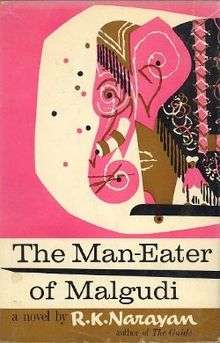The Man-Eater of Malgudi
The Man-Eater of Malgudi is a 1961 Indian novel, written by R. K. Narayan.[1] In this novel R.K. Narayan uses the myth of Bhasmasura
 First US edition | |
| Author | R.K. Narayan |
|---|---|
| Country | India |
| Language | English |
| Publisher | Viking Press (US) |
Publication date | 1961 |
| Media type | Print (Hardback & Paperback) |
| Pages | 250 |
Plot
This story revolves around the life of an Indian printer named Nataraj. Nataraj lives in a huge ancestral house in Malgudi, a fictional town in south India. This place is near Mempi hills which is very calm, pleasant and beautiful. He leads a contented lifestyle, with his own circle of friends, such as a poet, a journalist named Sen, and his one employee, Sastri. Like his other novel, Talkative Man, R.K. Narayan introduces a character who enters the life of Nataraj and the town of Malgudi. The character, Vasu, is a taxidermist who comes to Malgudi in search of the wildlife in Mempi hills near Malgudi. His introduction begins with his arrival at Nataraj's printing press, where he demands the printing of 500 visiting cards. This arrival begins the relationship between Vasu and Nataraj. While Nataraj wasn't sure whether Vasu is a friend or an enemy, he dislikes the company of Vasu because of his brazen actions.
Vasu is a bully, and is once compared to a Rakshasa (a demon) by Nataraj and Sastri. Vasu takes up residence in the attic of Nataraj's press by chance and convinces Nataraj that he would stay there as a guest (self declared) only for a few days until he gets put up some place else. Little known to Nataraj, Vasu sees the place very suitable for his activities as a taxidermist plans otherwise. Vasu is a 'pehelwan' (muscleman), proud of his strength. As the story continues, Vasu encroaches on Nataraj's life, every now and then bullies away his friends, his customers, shoots someone's pet dog and many other animals and birds near the dwelling place, poaches wildlife from Mempi hills, creates stench in the neighborhood through his activities as a taxidermist. When Nataraj questions this, Vasu files a complaint with the Rent Control authority on Nataraj as a self declared tenant, entertaining women in the attic, disturbs the peace of Malgudi, whom the narrator refers to as "the man eater of Malgudi"
As in Talkative Man, the end comes with the commemoration of a function. This time, it is for the release of a poetry book on Krishna by his poet friend. Rangi informs Nataraj that Vasu wants to kill Kumar, the elephant, which Nataraj had brought down from Mempi Hills to treat an ailment as a favour to one of his friends. Muthu, the tea shop owner helps Nataraj, when Nataraj happens to meet him under unexpected circumstances, owing to Vasu's adventures. Now Nataraj comes to know of the plans of Vasu to shoot Kumar, the temple elephant, for his collection and business. The protagonist frantically tries to stop him, but in vain. As Nataraj decides to talk to Vasu for once and for all, he finds Vasu sleeping, but the next morning he discovers that Vasu is dead.
The autopsy takes place with the verdict being that he was not poisoned and that he was attacked on the head by a blunt weapon. The case is closed, but the reputation of Nataraj's press is ruined and his friends and other people start avoiding him. Later, Nataraj learns through his friend Sastri (who learns from Rangi) that Vasu was not murdered, but died in an attempt to smash a mosquito sitting on his head. He had damaged one of his nerves with his powerful hand and died instantly.
Now Nataraj had got rid of Vasu, and the story ends on the note that all demons-rakshashas, devils and monsters bring the downfall to themselves. The narration is very humorous and lively all along.
The story with its pleasant twists features the metamorphosis of a quiet, spineless man (Nataraj) to rise up against his "friend" Vasu and the self destruction of the evil.
Characters
- Nataraj - a printing press owner.
- Poet - friend of Nataraj
- Sen - A journalist, friend of Nataraj.
- Sastri - employee and friend of Nataraj.
- Vasu - a taxidermist, the antagonist of the novel.
- Muthu - a tea shop owner.
- Kumar - an elephant which was brought from Mempi Hills by Nataraj, for medical treatment.
- Rangi - a temple dancer and a prostitute.
- Joshi - doctor who treats Kumar (the elephant).
References
- Sathupati Prasanna Sree (2005). Indian Women Writing in English: New Perspectives. Sarup & Sons. pp. 195–. ISBN 978-81-7625-578-3.